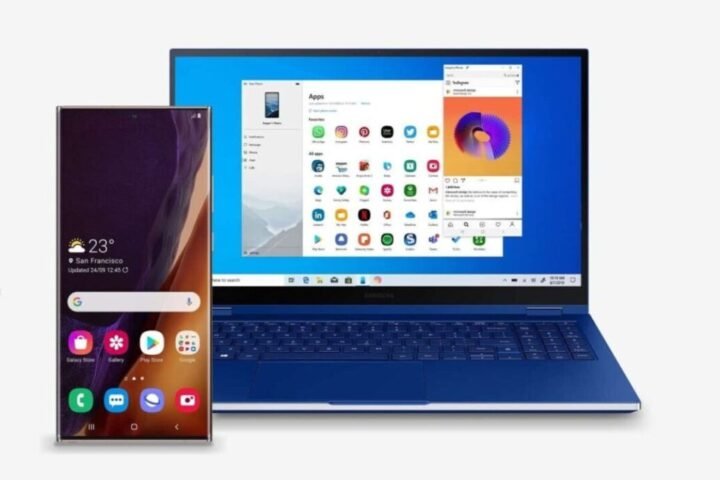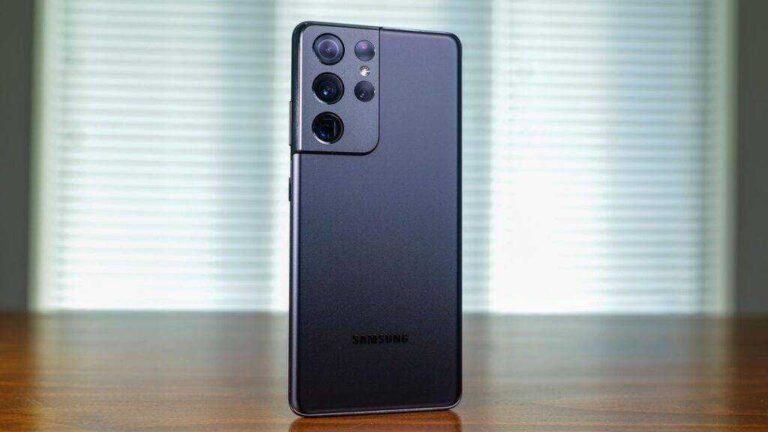Windows 11 Lets You Run Android Apps Natively On Your Samsung Laptop
Always wanted to run Android apps on your Samsung laptop? Well, you can do something like this with the Your Phone app from Microsoft and Samsung DeX. But that works by running the app on your Galaxy phone and then streaming it to your laptop’s screen, which isn’t a native experience. Windows 11 allows you to run Android apps natively on your Samsung laptop.
Microsoft announced the next major version of the Windows operating system – Windows 11 – last night. It has a redesigned user interface in a frosted glass look, a centrally aligned start menu, an improved action center, and notification area, as well as modern iconography. But more importantly, the company has developed a system that allows users to run Android apps natively on their Windows 11 computers. The new feature is compatible with 64-bit processors from AMD, Intel, and ARM such as the Snapdragon 7c of the Galaxy Book Go Gen 2.
Samsung Laptops Can Run Native Android Apps With Windows 11
The company uses Intel’s bridge technology to run Android apps on Windows 11. These apps can be downloaded from the Microsoft Store, which is integrated into Amazon’s app store collection. Android apps can be resized just like any other Windows application, but don’t expect them to scale well as screen sizes and aspect ratios are highly fragmented in the PC segment.
Microsoft will release the first beta (Insider) version of Windows 11 next week and the stable version will be released sometime in the fourth quarter of 2021. However, it will be rolled out more widely in the first quarter of 2022. Windows 11 is a free upgrade for those who already have a genuine copy of the Windows 10 operating system.
Long to come
It seems that people have been trying to make Android apps work on Windows PCs for ten years now. (Oh wait, it’s been a decade.) Microsoft has long struggled to attract app developers to Windows, even though tools are designed for Android and iOS developers to port their apps to Windows.
However, in recent years, Microsoft has changed its strategy by taking steps to bring your phone experiences to your PC. For example, the company’s Your Phone app lets you link your Android device to a Windows 10 PC to send and read texts, make and receive calls, view your photos, and receive notifications.
Towards the end of last year, Microsoft began rolling out an update to your phone that will allow you to run Android apps from your phone on your Windows 10 computer. The function originated from a relationship with Samsung and therefore currently only works with Samsung devices.
Samsung has also worked closely with Microsoft and Intel on its latest Galaxy Book Pro laptops to give them the responsiveness of a phone, as well as access to your Galaxy phone’s features and apps. The apps will continue to run in another window and not directly on the PC.
Intel helped
However, Windows 11 does not rely on an Android device to sync with your PC. Instead, the apps run on it natively using Intel’s Bridge technology, “a runtime post-compiler that allows applications to run natively on x86-based devices, including running those applications on Windows,” Intel said in its related announcement on Windows 11.
Instead of trying to get Android developers to convert their apps for Windows, as in the past, Microsoft teamed up with Intel to just make them work in Windows 11 — no code changes required. AMD and Arm chips also don’t need a bridge to run Android apps.
Amazon Is Part Of The Package
While Intel helps to run Android apps on Windows 11, Amazon – not Google – provides the apps to users. The Amazon Appstore will be integrated into the renewed Microsoft Store and can give both companies a boost.
Like Microsoft, Amazon is struggling to get developers to provide Android apps for its app store. Amazon’s Fire tablets run on a modified version of Android, and anyone who has one can tell you that there are many gaps in the offering. That’s why people install Google’s Play Store.
The Microsoft Store can be just as tedious – from making choices to navigating to paying. With the redesign, Microsoft promises to make it easier for developers to get their apps on the store and make more money from them. Amazon is also using the new access to hundreds of millions of Windows customers to attract developers and expand their reach by entering the app store. The redesigned Microsoft Store will include an integrated search, browse, and discovery function for apps.
It’s not clear whether you can download Android apps from other sources or install Google Play services and the Play Store separately like the Fire tablets. Amazon was the first to join, but Microsoft says it’s not exclusive. Maybe we’ll find out in the coming weeks. There will also be a public beta in July.
It is also not surprising that Google is not directly involved in this. After all, Google’s competing Chrome OS already has access to Android apps through the Google Play Store. The thing is, while it’s been an option for years, not all Android apps work on Chromebooks. Hopefully, Microsoft can avoid this with the way apps work on PCs.
Why do I want Android apps in Windows?
A big focus for Windows 11 (and Windows 10 as well) is this step towards an operating system and devices that perform equally well no matter how you use them. Your laptop experience should feel and be as responsive as your phone. Also, regardless of the device, you should be able to do the same things.
Opening Windows to Android apps means a wider choice of productivity and content creation, entertainment, and gaming tools. If you want to easily play your favorite mobile games on your laptop or desktop, now you can. Some services provide a better mobile app experience than web use.
By adding apps, Windows adapts to your needs more than the capabilities of the operating system. The addition of Android apps to Chrome OS gave Chromebooks a major boost in appeal. Adding the same flexibility to Windows should have a similar effect.
Windows 11: Minimum System Requirements
Most Samsung laptops, including the ARM-based ones, should be able to run Windows 11. The minimum system requirements to run Windows 11 include a dual-core 1 GHz processor (64-bit only), 4 GB RAM, 64 GB or more storage, UEFI and Secure Boot, Trusted Platform Module (TPM) 2.0 720p display, and an active internet connection.
Are you excited about Windows 11? Let us know your thoughts on it and your favorite new feature in the comments section below.



